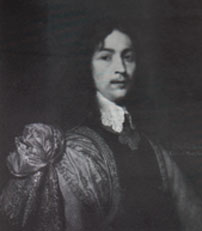Alexander Fitton facts for kids
Sir Alexander Fitton (1630?–1698) sometimes known by his Jacobite title Baron Gawsworth, was an Irish barrister and judge, who became Lord Chancellor of Ireland, despite having spent many years in prison for a criminal offence. who testified that he had forged the deed on Fitton's behalf. The Court ordered a jury to find the facts: they found that the deed was indeed a forgery, and while Fitton managed to get a second hearing before a Cheshire jury, the result was the same. Lord Gerard duly took possession of Gawsworth.
Which party (if either) was legally or morally in the right it is now difficult to say: it is suspicious that both parties were relying on documents whose very existence had been previously unknown, and it is quite possible that both the will and the deed were forged. Fitton proceeded to make a serious mistake in publishing a pamphlet directly accusing Gerard of winning the case by bribing and threatening witnesses, and including what purported to be Granger's confession that he had committed perjury. Fitton was perhaps unaware that to libel a peer was scandalum magnatum, a criminal offence. The House of Lords took a serious view of the matter: Fitton was fined £500 and committed to the King's Bench Prison until if ever he produced Granger to contradict Gerard's allegations against Fitton. Given Granger's character, it is hardly surprising that Fitton never did produce him, and he might well have remained in prison for life. As it was (though accounts differ) he may still have been in prison in 1687. The petition to the House of Commons of England in 1668 which is mentioned in Pepys' Diary came to nothing, as did an attempt to prosecute Gerard's witnesses for perjury. The disgrace of Gerard, now Earl of Macclesfield, who supported the Exclusion Bill and was later suspected of complicity in the Monmouth Rebellion, encouraged Fitton to make one last effort to recover Gawsworth; his case was dismissed for undue delay. The affair however caused the new King James II to look favourably on Fitton.

Lord Chancellor of Ireland
In 1687 the Irish Lord Chancellor Sir Charles Porter expressed reservations about the King's policy of religious toleration and was dismissed; while Richard Nagle, the Attorney General for Ireland, a Roman Catholic, put forward his own claim to the office, James was persuaded that Fitton, a Protestant, would be a better choice. Fitton thought it advisable nonetheless to convert to Catholicism. His salary was increased by £500 to £1500 per annum, and a once-off payment of £1250 from the secret service fund. He also received a knighthood. As Lord Chancellor, he was accused of ignorance, prejudice and bias against Protestants, although some historians have questioned the accuracy of these charges. When James II arrived in Ireland Fitton presided over the Patriot Parliament of 1689; he was given a barony and chose the title Baron Fitton of Gawsworth. When James fled Ireland after the Battle of the Boyne Fitton was appointed a Lord Justice of Ireland, alongside Francis Plowden and Richard Nagle, and acted on behalf of the King in his absence. The following year he joined James in France, although it is unclear if any proceedings were pending against him. He died at St. Germain in 1698.
Character
Fitton has been judged harshly both by contemporaries and by later historians, especially Thomas Macaulay, who dismissed Fitton as a "pettifogger" without legal ability or commonsense, and unfit by reason of his imprisonment for libel and the strong suspicion that he was guilty of forgery as well to hold any office. William King, Archbishop of Dublin, who knew him personally, said that Fitton could not understand the merits of any difficult case, and so decided them all on the basis of his own prejudices. However O'Flanagan, writing in 1870, took a more favourable view, stating that he had examined Fitton's judicial decrees and found in them no evidence of ignorance or incapacity; on the contrary, they appeared to be the work of an experienced equity judge.
On the accusation of forgery, the safest view is that Gerard and Fitton were both guilty of it; Elrington Ball remarks that "bad as Fitton's character may have been, it can scarcely have been worse than that of Lord Gerard".

